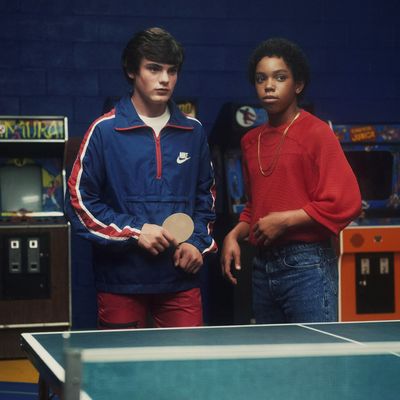
Even when theyÔÇÖre good, many coming-of-age movies these days seem to be of the noxiously self-congratulatory kind. TheyÔÇÖre not that interested in offering insights into lives other than the audienceÔÇÖs own. Instead, they offer reassuring nostalgia trips, usually into the ÔÇÿ80s, reassuring all us 30- and 40-something viewers that the lives we once led were, in fact, the most interesting ones. But itÔÇÖs useless to resist; collective memory is now the genreÔÇÖs currency.
But then thereÔÇÖs Michael TullyÔÇÖs 1985-set Ping Pong Summer, which seems at first like itÔÇÖs going to be a similar sort of wallow in the artifacts of our collective past. And it is, I suppose. But whereas other movies use nostalgia to coax their stories along, Ping Pong Summer is about that very wallow in a more fundamental way. ItÔÇÖs so dedicated to the odd textures of its world that it becomes something else ÔÇö personal, abstract, and strangely honest.
When we first meet Radford (a.k.a. Rad) Miracle (Marcello Conte), heÔÇÖs popping in a rap cassette and working on his moonwalk and ping-pong moves while wearing parachute pants and high-tops. In his mind, heÔÇÖs got smooth moves and hot threads; to everyone else, heÔÇÖs an uncoordinated dork. The film takes place over a summer visit to the resort town of Ocean City, Maryland, where Rad makes contact with the usual coming-of-age touchstones: He makes friends with likable, dorky Teddy (Myles Massey), who shows him an arcade called the Fun Hub; he runs into the town bully, a rich kid named Lyle (Joseph McCaughtry) who likes to tear around in fancy cars listening to Mr. Mister; he falls for the local cutie (Emmi Shockley), who is addicted to funk punch, an Icee mixed with Pixy Stix and cocaine; and he gets pointers about life and ping-pong from his eccentric neighbor, Randi Jammer (noted ping-pong enthusiast Susan Sarandon). And so, our hero learns about loyalty, sticking up for friends, and learning to be yourself. Yes, thereÔÇÖs a climactic ping-pong match, too. Along the way we also get discussions of the slang term bad, an extended tribute to the wonders of Casey KasemÔÇÖs long-distance dedications, and a few welcome moments with a Harlem Globetrotters pinball machine.
Ping Pong Summer delivers these clich├®s with a certain nonchalance that suggests its interest lie elsewhere. The film is rough around the edges, but purposefully so. The kids are alternately stiff or overemotive. Sarandon is clearly having fun playing Mr. Miyagi to the awkward Rad, but even her performance feels curiously noncommittal, as if sheÔÇÖs just taking a summer break herself. The awkward acting and storytelling, along with the evocatively grainy 16-mm camerawork, give the film a handmade quality ÔÇö as if the movie itself were one of the artifacts it so lovingly, relentlessly depicts.
But whatÔÇÖs so refreshing about TullyÔÇÖs film is that it doesnÔÇÖt try to make a nostalgia pact with its viewer: IÔÇÖll give you a few easy, homesick chuckles for your lost childhood, and youÔÇÖll reward me with your emotional investment. It keeps all its characters and incidents at a strange remove. ItÔÇÖs more interested in those flashing arcade games, those goofy dance moves, those Icees, all that candy-colored runoff of teenage materialism ÔÇö as if Kenneth Anger tried to remake The Way Way Back. It goes back to the nostalgia well so often that it ultimately becomes about that nostalgia well. And I canÔÇÖt help but think thereÔÇÖs a curious sincerity there. Ping Pong Summer is all surface, but itÔÇÖs beautiful.


